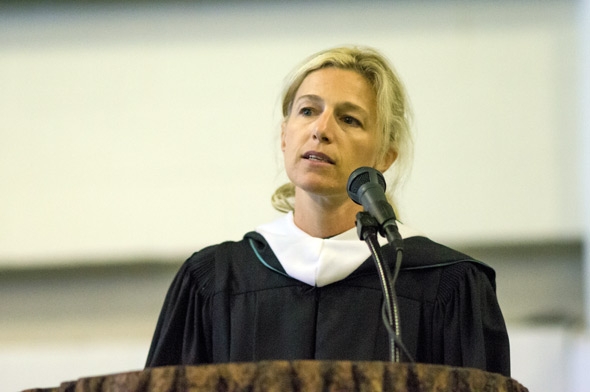Knuckleball!, a documentary film produced by Dartmouth alumnae Ricki Stern ’87 and Annie Sundberg ’90, will be screened at 6:30 p.m. on October 27 in the Black Family Visual Arts Center’s Loew Auditorium. After the film, Stern will answer questions from the audience.

Stern and Sundberg have worked together on several award-winning documentaries, including Joan Rivers—A Piece of Work, The Devil Came on Horseback, and The Trials of Darryl Hunt. Knuckleball! follows the lives and careers of two Major League Baseball pitchers, R.A. Dickey and Tim Wakefield, who rely on a most unpredictable pitch—the knuckleball.
Stern, who delivered this year’s Convocation address, says one of the most important aspects of her films is the people she profiles.
“The films Annie and I have been making have always been about characters,” she says. “They may sometimes have a political or social angle, but they’re really about people, and for me, I think that stems from my background in acting where I look at a person and wonder, ‘What motivates you? What are your obstacles? How are you going to overcome those obstacles?’ I apply that same theater discipline of finding out about a character to my documentaries.”
A knuckleball is delivered at a slower speed than most pitches, with little or no spin, and changes direction unpredictably. This makes it difficult for pitchers to throw strikes, hitters to make contact with the pitch, and catchers to anticipate where the ball will end up. In a July 9, 2012, Wall Street Journal article, Jason Varitek, a former catcher who caught for Wakefield with the Boston Red Sox, said that trying to catch a knuckleball was like “trying to catch a fly with a chopstick.”
A knuckleball pitch can be unreliable—it depends on the wind, humidity level, and other variables—and can result in disaster for the pitcher if it doesn’t “break” or move; it becomes a slow, straight pitch that is easy for a batter to hit. Stern calls Wakefield and Dickey “outliers” in baseball—Wakefield has since retired and Dickey, who plays for the New York Mets, is the only pitcher left in the Major Leagues who consistently throws the pitch.
“To the masses,” Dickey says in a trailer for the film, “it’s a circus pitch.” Dickey won 20 games this year against only six losses and is considered a leading contender for the 2012 National League Cy Young Award, which will be announced in November.
Jeffrey Keller ’12, captain of the Dartmouth baseball team, says he has never faced a pitcher who threw a knuckleball consistently.
“I can’t say that I’ve ever faced a knuckleball pitcher or even thrown one myself. I’ve faced guys in high school that threw a knuckleball, or at least tried to. For those guys that don’t have an MLB-caliber knuckler, it’s not a very good pitch. It’s useful, though, because it startles a hitter the first time he sees it,” Keller says.
When Keller faced it, it didn’t matter whether the knuckleball broke unpredictably or not. “I never really swung because I was so surprised,” says Keller.

